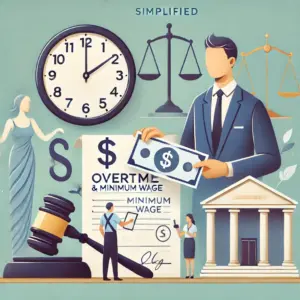 Wage and hour laws are complex. Most workers don’t know their rights. This article is making it simple. We’re talking about overtime, minimum wage, and employee rights. Knowing these laws empowers you. You’ll know your pay and your rights.
Wage and hour laws are complex. Most workers don’t know their rights. This article is making it simple. We’re talking about overtime, minimum wage, and employee rights. Knowing these laws empowers you. You’ll know your pay and your rights.
Minimum Wage: Your Basic Right
Minimum wage is the lowest one that an individual can be paid hourly by an employer. It varies by state and even sometimes city. There’s a federal one. Others have others besides that. Look up your state codes. It provides a floor of good living. Employers must abide by it under law. Employers are penalized if they don’t.
Overtime: Pay for Working Extra Hours
Overtime is when you’re over 40 hours in a work week. It normally pays 1.5 times whatever you would get otherwise. Some states have legislation regarding overtime in the daytime as well. This is over some number of time in a day. Overtime protections safeguard workers from working too much. Overtime legislation provides equal pay for overtime work.
Exempt vs. Non-Exempt Employees
Not everyone is covered by overtime. There are “exempt” employees. They are usually salaried employees who are in management or professional positions. They must qualify in some ways. Others are “non-exempt.” They are covered by overtime pay. Pay attention to your status. Your title is great. Your actual responsibilities are more important.
Record Keeping: Your Pay Stub Is Important
Your work hours must be properly reported by your employer. They must report your pay rate and overtime. Your pay stub is important. It is proof of your payment. Keep your pay stubs. Review them for mistakes. Report mistakes.
Deductions: What Can Be Deducted
There are some things that your employer can deduct from your paycheck. Taxes are usual. Insurance premiums are another. There are deductions that require your authorization. Others are mandated by law. Be aware of what can be deducted. Dispute anything that does not seem right.
Employee Rights: More than Just Pay
Wage and hour laws are not limited to wages. They include meal and rest breaks as well. Some of them are state-mandated. They restrict employees from working long hours without a break. They ensure a healthy and safe working environment.
Retaliation: Protection for Speaking Up
You can complain if your employer is breaking wage and hour law. Your employer cannot retaliate against you. This is illegal. This also stops them from demoting or firing you. They cannot harass you. Retaliation is illegal. If it does happen, report it.
Filing a Complaint: Taking Action
If you feel your rights are being infringed, you may complain. Contact your state labour department. You can also call the U.S. Department of Labour. They will look into your complaint. They will help you recover back pay owed to you.
Independent Contractors vs. Employees
Independent contractors are an employee category. They do not receive the protection of the same wage and hour legislation as the regular employee. Misclassification is a negative. Employers misclassify certain workers so that they will not pay them overtime. It is important to know your worker classification. It determines your rights.
State Laws: Differences Exist
State law is superior to federal law. There are a few states with a higher minimum wage. There are a few states with higher overtime laws. Look at your state laws. They do provide higher protection.
Being Aware: Your Best Defence
Wage and hour laws will evolve. Stay up to date. Get updated regularly. Call an attorney if you must. They can provide legal advice. They can tell you about your rights.
Resources: Where to Get Help
You have a number of resources at your disposal to help you. The U.S. Department of Labour does. So does your state labour department. Legal aid societies are available as well. They offer low-cost or no-cost legal assistance.
Conclusion
You must learn the wage and hour laws. It is your rights defender. It compensates you for being worth it. Don’t be afraid to raise your voice. Don’t be afraid to seek assistance. Your work is deserving of your time. Learn to recognize your worth.




